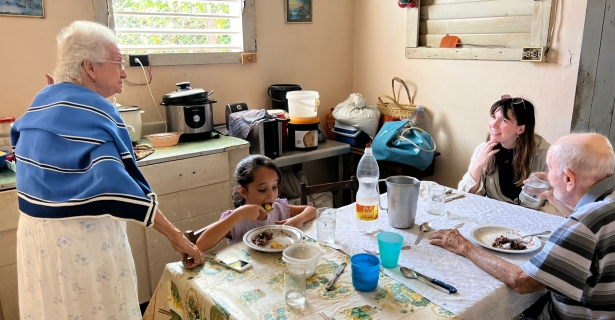Prior to travelling to Cuba, I didn’t know what to expect.
When trying to understand the reality of life on the island through google searches, it was apparent that the truth was obscured by government-owned travel agencies and hotels flashing images of beautiful beaches and retro cars.
When I first arrived, through my window, even while blurred by my moving taxi, it became apparent that the photos I had found on google had not captured the reality I was witnessing. By the time I reached the Airbnb, my conception of Cuba that once only consisted of photos of fancy rooftops with luxury bars and salsa dancers was replaced with crumbling buildings and the remains of bankrupt store fronts. As my taxi driver, Carlos, rounded the corner of Companario, I had arrived at the place I would call home for the next eight days.
After putting my luggage away, another student, Gabby, and I walked along the streets near our apartment to familiarize ourselves. We walked down the street until we reached the T-intersection that led to a plaza. Along the water, the unmarked plaza had three fountains—all of which were non-operational and slowly eroding. Within the basins of the fountains, Gabby and I watched as a group of boys, whose ages likely ranged from 7-17, played fútbol. As someone who grew up loving soccer, I became emotional watching them play with a ball that was visibly deflated and torn on all sides.
Yet, as I was thinking about how the ball they played with would be considered trash where I played as a child, all I could hear was laughter and all I could see were smiles—especially when the “referee” would pull out reused pieces of paper to give a yellow card. This scene captured a lot of themes I would see over the next couple of days: even as families struggled to put food on the table and clothes on their backs, Cuban’s kept smiling and kept laughing.
Every morning, I would walk down the street to grab coffee from a man who was selling a shot of espresso for 30 Cuban pesos—equivalent to one dollar and 25 cents—and he would greet me with a warm smile each time. I saw groups of children playing baseball with a bottle cap and a stick, men who propped up their 1950’s Chevy BelAir’s with chipped cement blocks as they repaired their cars with their neighbors.
It became clear overtime that the joy I felt around me was because, in a city as big as Havana, it felt like a small town. It was commonplace to see street-level apartments with wide open doors, and people perched up on their balconies, watching as people walk by or chatting with their neighbors below. Down every street, people kept an eye on what was happening.
Carolina, another student on this trip, filled me in on something a local had told her. When she had asked a local lady why she never saw any ambulances, the lady responded with ease: “We take care of each other here. In the event of an injurious accident, neighbors, and even strangers, would instantly respond to help by picking you up, placing you in their cars, and driving you to the hospital.” When I heard this story, I was amazed; can you imagine this type of community initiative in the United States? I thought about this repeatedly throughout my time in Havana.
On the last night of my trip, I watched from my balcony as my neighbors gathered in front of a door a few houses down to sing Happy Birthday as the clock struck midnight. Lights turned on around them, and people filed out of their houses onto their streets and balconies to clap. I was so lucky to witness this in my last moments on the island. It solidified an appreciation for Cuba that no google search could have shown me: in the absence of the material wants, and at times basic needs, the embracing of community and the dedication to each other built a joy that couldn’t be taken away.

